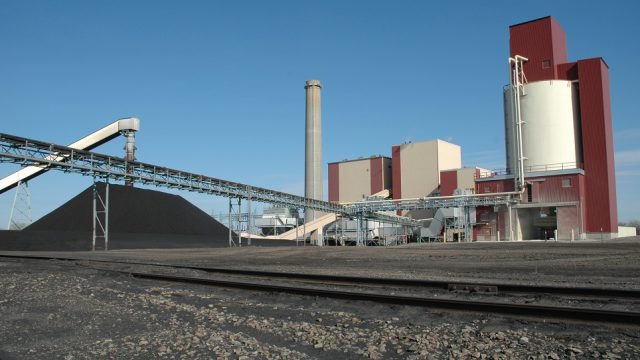War on Coal: Great River Energy Closing Stanton Station Plant

Citing low prices and the current economic environment, Great River Energy has announced that they’ll be closing their Stanton Station plant in Mercer County.
There has been plenty of national news about coal plants closing, but this is the first news of a coal-fired power plant closing in North Dakota. Here’s the press release from the Great River Energy website:
Great River Energy has announced plans to retire the Stanton Station power plant by May 2017 because the plant is no longer economic to operate with current low prices in the regional energy market. Stanton Station is located near Stanton in Mercer County, N.D.
“Stanton Station has provided dependable electricity to Great River Energy’s member cooperatives for 50 years,” said David Saggau, Great River Energy president and CEO. “The plant’s long and successful record was possible thanks to a talented staff and supportive community.”
“After careful consideration of several alternatives, it became clear that retiring the plant was in the best interest of our member cooperatives,” Saggau added. Recently, Stanton Station has been generating electricity on a limited basis due to economic conditions. During that time, it has often been more affordable to operate other plants or purchase power from the regional market.
“We are making every effort to minimize impacts on our employees and the community through this transition,” Saggau said. “We are providing Stanton Station employees with a number of support resources and services whether or not they continue working for Great River Energy at another location.”
Great River Energy continues to operate the Coal Creek Station power plant, which is located northeast of Stanton, and the Spiritwood Station plant near Jamestown, N.D. Great River Energy is the majority owner of Midwest AgEnergy Group which owns and operates two ethanol plants and related facilities in North Dakota. Great River Energy also maintains a number of transmission facilities in the state. “We remain a committed partner in North Dakota’s energy industry,” Saggau said.
Great River Energy is developing plans to decommission Stanton Station in a responsible manner that will safeguard the local environment and assure the safety and security of the local community. Stanton Station, which began generating power in 1966, has a generating capacity of 189 megawatts.
The plant employs 65 people.
The press release doesn’t cite the rising costs of increasingly draconian federal regulation, but that’s certainly a factor. From a frequently asked questions link included with the Great River announcement (emphasis mine):
Great River Energy is closing Stanton Station, located near Stanton, N.D., because the plant is no longer economic to operate due to low energy prices in the regional market. We were faced with making significant improvements at the plant. Those improvements, if made, would have further increased the cost of electricity from Stanton Station and made it even more challenging to recover the costs to operate the plant. Stanton Station will close by May 2017.
Some of this is competition from natural gas. Fracking has lowered the price of natural gas, and natural gas is competing with coal. And if that were the only reason Great River Energy were making this decision, then that would be fine.
But we have a president in Barack Obama who vowed, at the down of his administration, to bankrupt the coal industry. And now here we are. That’s something every Democratic candidate on the ballot in North Dakota should have to respond to this cycle.
Below you can see a press release from the Sierra Club which is already taking a victory lap.
Make no doubt about it, this is tough news for North Dakota. If Great River Energy found itself in this spot you can bet the other companies operating coal plants and/or mines are in similarly rough shape. Granted, Stanton Station is an older plant, and a smaller plant, but absent the federal government’s war on coal there was probably a way to keep this plant online.
Put simply, I don’t think this has to happen. And I think there’s a real threat for the rest of the state’s coal industry.
The last thing this state needs, with oil and agriculture hurting already, is for the coal industry to crater too.
[scribd id=318420559 key=key-SMLVjdKGxbzxw7SMhkiP mode=scroll]




